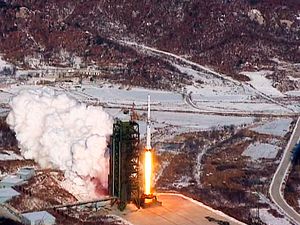Recent weeks have seen growing alarm over North Korea’s nuclear program. This month, numerous senior U.S. military officials said that Washington believes North Korea has the ability to strike the western United States with a nuclear-tipped KN-08 intercontinental ballistic missile. “Our assessment is that they have the ability to put a nuclear weapon on a KN-08 and shoot it at the homeland. We assess that it’s operational today,” William Gortney, commander of the North American Aerospace Defense Command (NORAD) told reporters.
The Wall Street Journal reported that Chinese experts believe Pyongyang has already amassed twenty nuclear warheads, and could double that number within a year. That report came on the heels of a widely discussed report by the U.S.-Korea Institute at the Johns Hopkins School of Advanced International Studies (SAIS), which assessed that North Korea could drastically expand the size of its nuclear arsenal over the next five years.
Specifically, in its most dire forecast, the SAIS report suggested that North Korea could expand its nuclear arsenal from 10-16 nuclear warheads today, to as many as 100 warheads by 2020. The report’s mid-range forecast was that North Korea will have 50 nuclear warheads in five years’ time, while its low-end estimate is that Pyongyang will have just 20 bombs in 2020.
These revelations have greatly unnerved regional analysts. Indeed, in a recent article on The Diplomat, Robert Kelly argued that if North Korea’s nuclear arsenal keeps expanding, South Korean leaders may need to consider a preemptive strike to destroy Pyongyang’s strategic weapons.

































